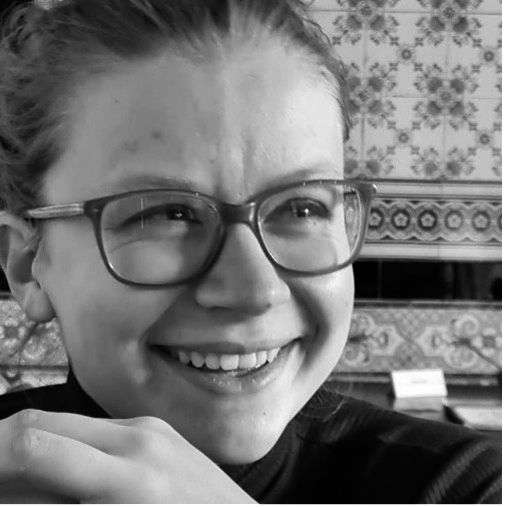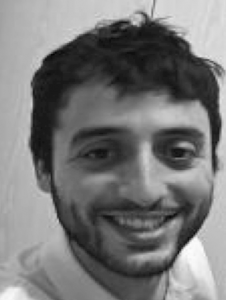EuroVis Annual Award for Best PhD Thesis
The EuroVis Best PhD Dissertation Award recognizes outstanding dissertations in academic research and development over topics relevant to visualization. The intent of this award is to recognize excellent young researchers in their early career and to highlight visualization research. The award is managed by the Best PhD dissertation committee, constituted by a Chair appointed by the EuroVis Steering Committee.
The current chair is Thomas Ertl.
EuroVis PhD Award 2025: Nominations can be submitted until January 31st, 2025. See below for details.
Best PhD Awards 2024
 Sara Di Bartolomeo, Northeastern University Boston, USA
Sara Di Bartolomeo, Northeastern University Boston, USA
For her outstanding PhD thesis “Layered graphs and their layouts, evaluations, and applications” which presents an optimal layout algorithm for layered graphs, new heuristic-based approaches to highlight trends and patterns in the underlying data, the application of layout algorithms to hypergraphs, and an investigation how the shape of the layout influences the understanding of features in the data.
 Angelos Chatzimparmpas, Linnaeus University Växjö, SE
Angelos Chatzimparmpas, Linnaeus University Växjö, SE
For his outstanding PhD thesis “Visual Analytics for Explainable and Trustworthy Machine Learning” which introduces novel and effective visual analytics techniques to enhance trust and understanding in complex machine learning models, combining comprehensive meta-analyses and data- and model-agnostic technical solutions for the various stages of the machine learning pipeline while focusing on high-risk domains like healthcare and improving the transparency and reliability of human-centered AI systems.
2024 Committee
Beatriz Sousa Santos, University of Aveiro, PT
Rosane Minghim, University College Cork, IR
Guy Melançon, University of Bordeaux, F
Hans-Jörg Schulz, Aarhus University, DK
Torsten Möller, University of Vienna, A
Thomas Ertl (Chair), University of Stuttgart, DE
Best PhD Awards 2023
 Christoph Schulz, University of Stuttgart, DE
Christoph Schulz, University of Stuttgart, DE
For his outstanding PhD thesis “Uncertainty-aware Visualization Techniques” which significantly expands the solutions for uncertainty visualization from the scientific and medical domain to information visualization, i.e. networks, hierarchies, multivariate time series, and high-dimensional data. This superbly written thesis combines visualization techniques with stylistic rendering and tightly couples its methods to a multitude of applications covering medicine and biology, general relativity and software visualization.
 Lutz Hofmann, Heidelberg University, DE
Lutz Hofmann, Heidelberg University, DE
For his outstanding PhD thesis “Local Features and Topology in Higher-Dimensional and Time-Dependent Vector Fields” which extends vector field topology to four-dimensional vector fields and provides fundamental approaches to visualize and navigate four-dimensional space. This mathematically rigorous thesis generalizes the parallel vectors operator and unifies vortex core lines and ridge surfaces regarding their definition and extraction for arbitrary dimensions.
 Chiara Hergl, University of Leipzig – DE
Chiara Hergl, University of Leipzig – DE
For her outstanding PhD thesis “Analysis and Visualization of Higher-Order Tensors” which addresses the untouched problem of the visualization of 3D-tensors with higher order than two, like the ones governing stiffness in hyperelastic materials and electro-mechanical coupling in electroactive polymers. This mathematically elaborate thesis introduces the deviatoric decomposition of a 3D tensor into a set of vectors and scalars, which are then visualized by glyph-based and line-based techniques.
2023 Committee
Rita Borgo, Kings College London, UK
Barbora Kozlíková, Masaryk University, CZ
Alexandru Telea, Utrecht University, NL
Tobias Günther, University of Erlangen, DE
Markus Hadwiger, KAUST, SA
Thomas Ertl (Chair), University of Stuttgart, DE
Best PhD Awards 2022
 Fritz Lekschas, Harvard University, US
Fritz Lekschas, Harvard University, US
For his outstanding PhD thesis “Scalable Visualization Tools for Pattern-Driven Data Exploration” in which he provides novel scalable and interactive interfaces to explore real-world problems across bioscience with a very generic scope. This thesis combines analytic approaches and interactive data visualization for searching for patterns of interest in large sequential, matrix and image data and it develops a generic framework for exploration and comparison of large numbers of detected patterns across different scales and datasets.
 David Kouřil, TU Wien, AT
David Kouřil, TU Wien, AT
For his outstanding PhD thesis “Interactive Visualization of Dense and Multi-Scale Data for Science Outreach” which addresses the problem of navigating in complex 3D models composed of large numbers of molecular instances packed densely in three-dimensional space. This thesis provides a framework for interactive labeling and enhancing scene visibility in a multi-scale, hierarchically organized dense content and for the automatic generation of a descriptive animation with a voice-over narrative.
2022 Committee
Natalia Andrienko, Fraunhofer IAIS and City University of London
Lars Linsen, University of Münster
Min Chen, University of Oxford
Thomas Ertl, University of Stuttgart (Chair)
Best PhD Awards 2021
 Irene Baeza Rojo – ETH Zurich, CH
Irene Baeza Rojo – ETH Zurich, CH
For her outstanding PhD thesis “Feature Extraction and Scalable Exploration for Scientific Data Analysis and Visualization” in which she has made a number of novel contributions that push the frontiers of the state-of-the-art in visualization of flows and volumes. This thesis combines theoretical depth with practical relevance and a thorough evaluation of the underlying implementations to deliver impressive visualization of flows for a variety of application domains.
 Davide Ceneda – TU Wien, AU
Davide Ceneda – TU Wien, AU
For his outstanding PhD thesis “Guidance-Enriched Visual Analytics” where he defines and characterizes “guidance” in Visual Analytics and outlines a general model that facilitates in-depth reasoning about guidance based on a thorough literature review. This thesis work, already highly cited, provides practical guidelines for incorporating guidance into visual analytics tools and lays out a research agenda for the systematic development of guidance techniques for visual analytics.
 Daniel Cornel – TU Wien, AU
Daniel Cornel – TU Wien, AU
For his outstanding PhD thesis “Interactive Visualization of Simulation Data for Geospatial Decision Support” where he has developed a comprehensive platform for analyzing flood simulations that supports the comparison of ensembles of possible futures. This thesis provides an impressive technical solution that is deployed with real-world collaborators, and also introduces novel visualization techniques that can be applied in a variety of other simulation applications.
2021 Committee
Jean-Daniel Fekete, Inria, Saclay, France
Thomas Ertl, Univ. of Stuttgart, Germany
Heike Leitte, Univ. of Kaiserslautern, Germany
Jessie Kennedy, Napier University, Edinburgh, Scotland, UK (for now)
Ross Maciejewski, Arizona State University, USA
Andreas Kerren, Linköping University and Linnaeus University, Sweden
Christophe Hurter, French Civil Aviation University, Toulouse, France
Best PhD Awards 2020
 Jonas Lukasczyk – University of Kaiserslautern, DE for his outstanding PhD thesis “Topology-Based Characterization and Visual Analysis of Feature Evolution in Large-Scale Simulations” where he addresses a very challenging problem. It is an excellent example of the combination of strong mathematical concepts with visual analytics to solve real-world problems. To make his work accessible to a larger audience he provides his algorithms open-source in the topology toolkit TTK.
Jonas Lukasczyk – University of Kaiserslautern, DE for his outstanding PhD thesis “Topology-Based Characterization and Visual Analysis of Feature Evolution in Large-Scale Simulations” where he addresses a very challenging problem. It is an excellent example of the combination of strong mathematical concepts with visual analytics to solve real-world problems. To make his work accessible to a larger audience he provides his algorithms open-source in the topology toolkit TTK.
 Monique Meuschke – University of Magdeburg, DE for her outstanding PhD thesis “Visualization, Classification, and Interaction for Risk Analysis and Treatment Planning of Cerebral Aneurysms” where she presents substantial improvements to the visual assessment and decision support for the diagnosis of cerebral aneurysms. Her very advanced visualization techniques of cerebral aneurysms using multiple modalities allow their exploration, prediction of chances of rupture, and classification for eventually improving their treatments.
Monique Meuschke – University of Magdeburg, DE for her outstanding PhD thesis “Visualization, Classification, and Interaction for Risk Analysis and Treatment Planning of Cerebral Aneurysms” where she presents substantial improvements to the visual assessment and decision support for the diagnosis of cerebral aneurysms. Her very advanced visualization techniques of cerebral aneurysms using multiple modalities allow their exploration, prediction of chances of rupture, and classification for eventually improving their treatments.
2020 Committee
Jean-Daniel Fekete, Inria, FR (chair)
Stefan Bruckner, University of Bergen, NO
Ingrid Hotz, Linköping University, SE
Robert S Laramee, University of Nottingham, UK
Gerik Scheuermann, University of Leipzig, DE
Julien Tierny, Sorbonne University, FR
Best PhD Awards 2019
 Sergej Stoppel – University of Bergen, NO for his outstanding PhD thesis “User-Centric Parameter Specification for Interactive Virtual and Physical Visual Representations” where he showcases highly creative and inspiring ideas and solutions to help analysts navigate complex parametric spaces using virtual, physical, and physically inspired devices.
Sergej Stoppel – University of Bergen, NO for his outstanding PhD thesis “User-Centric Parameter Specification for Interactive Virtual and Physical Visual Representations” where he showcases highly creative and inspiring ideas and solutions to help analysts navigate complex parametric spaces using virtual, physical, and physically inspired devices.
 Thomas Mühlbacher – Technical University Vienna, AU for his outstanding PhD thesis “Human-Oriented Statistical Modeling: Making Algorithms Accessible through Interactive Visualization” introducing an innovative, consistent. and efficient framework to provide visual guidance to analysts, rethinking the dominating “black-box” paradigm.
Thomas Mühlbacher – Technical University Vienna, AU for his outstanding PhD thesis “Human-Oriented Statistical Modeling: Making Algorithms Accessible through Interactive Visualization” introducing an innovative, consistent. and efficient framework to provide visual guidance to analysts, rethinking the dominating “black-box” paradigm.
2019 Committee
Jean-Daniel Fekete, Inria, FR (chair)
Niklas Elmqvist, Univ. of Maryland, US
Miriah Meyer, Univ. of Utah, US
Berhard Preim, University of Magdeburg
Jarke van Wijk, Eindhoven University of Technology, NL
Best PhD Awards 2018
 Tanja Blascheck – University of Stuttgart, DE for her outstanding PhD thesis “Understanding Interactive Visualizations: Leveraging Eye Movements and Visual Analytics” introducing novel methods to evaluate visualization using eye tracking by triangulating with multiple data sources.
Tanja Blascheck – University of Stuttgart, DE for her outstanding PhD thesis “Understanding Interactive Visualizations: Leveraging Eye Movements and Visual Analytics” introducing novel methods to evaluate visualization using eye tracking by triangulating with multiple data sources.
 Michael Glueck – University of Toronto, CA for his out standing PhD thesis “Ontology-based Context in Visualizations to Facilitate Sensemaking: Case Studies of Phenotype Comparisons” proposing effective visual analytic interfaces for helping medical domain experts understand large-scale patient records using medical ontologies.
Michael Glueck – University of Toronto, CA for his out standing PhD thesis “Ontology-based Context in Visualizations to Facilitate Sensemaking: Case Studies of Phenotype Comparisons” proposing effective visual analytic interfaces for helping medical domain experts understand large-scale patient records using medical ontologies.
 Renata Raidou – Eindhoven University of Technology, NL for her outstanding PhD thesis “Visual Analytics for Digital Radiotherapy; Towards a Comprehensible Pipeline” that introduces novel and effective visual analytics solutions to the multiple stages of complex analyses related to radiotherapy.
Renata Raidou – Eindhoven University of Technology, NL for her outstanding PhD thesis “Visual Analytics for Digital Radiotherapy; Towards a Comprehensible Pipeline” that introduces novel and effective visual analytics solutions to the multiple stages of complex analyses related to radiotherapy.
2018 Committee
Jean-Daniel Fekete, Inria, FR (chair)
Helwig Hauser, Univ. of Bergen, NO
Niklas Elmqvist, Univ. of Maryland, US
Hans Hagen, Univ. of Kaiserslautern, DE
Heidrun Schumann, Univ. of Rostock, DE
Jarke van Wijk, Eindhoven University of Technology, NL
Submission
The student’s advisor should nominate the candidate using the online form. The package must include:
- A nomination letter written by the student’s advisor, which includes:
- the name, email address, and phone number of the advisor,
- the name, email address, and CV of the candidate, and
- a one-page summary of the significance of the dissertation (references to papers should be provided on an extra sheet)
- A copy of the dissertation.
- Optional additional letters of recommendation or assessments on the candidate thesis, such as reviewing or defense reports, can also be attached to the submission.
For questions, contact Thomas Ertl (eurovis-phd-award@eg.org)
Submission deadline
January, 31st 2024
Eligibility
All PhDs from the European visualization community (e.g., through contributions to the EuroVis conference) that defended and get awarded the degree of Doctor between Jan 1, 2023 and Dec 31, 2024 are eligible for the 2025 competition.
There is no limitation on the number of nominations that may be made by a university.
Invited STAR
Aligned with the Eurographics PhD Award, the awardees of the EuroVis PhD Award will offered the opportunity to publish the state of the art section of their thesis as a STAR in the Computer Graphics Forum Journal.
Selection Procedure
Four to six recognized members of the EuroVis community, selected by the Chair, will form a review committee to thoroughly review and assess the dissertation submissions. The committee will judge the dissertations based on their intellectual merit, technical depth, and presentation quality.
The committee is selected with prominent members of the EuroVis community. Their names are public to foster transparency and attest of the value of the awards. The selection is done after all the applications are received to avoid hard conflicts, i.e. advisors of applicants in the committee. The chair cannot be conflicted either so none of his former PhD students can apply during his term. Soft conflicts are possible: a committee member can be part of the institution of an applicant, either during the PhD or after, or have co-authored with the applicant. In that case, the committee member will not be able to speak about the application during the discussion and can decide or be asked to leave the discussion when it concerns the applicant in soft conflict. Prominent researchers are used to handling these cases when they participate in a selection or prize jury.
The selection is handled in two to three meetings, usually conducted through a videoconferencing system:
- They agree on the selection process, on the eligibility of the applicants, and get assigned four PhDs, each PhD being reviewed by two committee members. They will have to read and score them according to the scientific contribution, difficulty of the problem addressed, originality of the solution, quality of the writing/presentation, potential/effective impact, number of EuroVis publications. The citations according to Google Scholar are also collected, as well as the duration of the PhD, that varies widely throughout the institutions and countries. The information gathered is used to provide factual information to the debate, no automatic ranking or scoring is used to filter out applicants.
- The committee meets again and discusses each of the PhDs. In the end, a shortlist of 2-6 PhDs is selected from intense discussions. A major rule is to remain positive about all the PhDs. Each member of the committee needs to complete their reading of all the shortlisted PhDs for the next meeting and provide a full ranking (except for the soft conflicts obviously).
- The committee meets and compares the ranking, discussing the differences in the ranking to achieve a consensus. It can decide to select up to 3 PhDs to be awarded.
